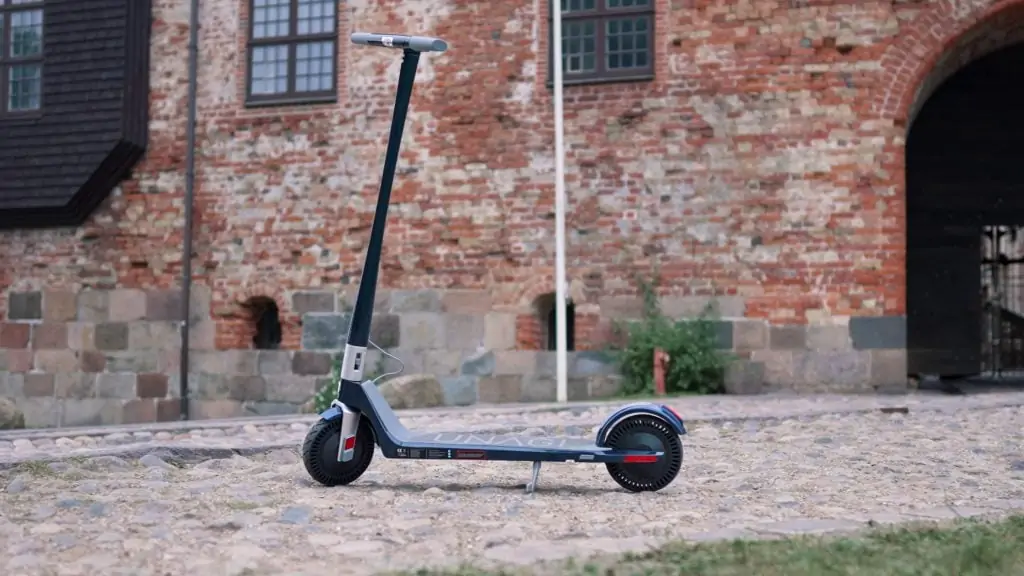
Our review score is based on thorough real-world testing and is always held up against comparable models.
How We TestValues marked with '*' are based on our independent testing and may differ from those specified by the manufacturer.
After riding more than 150 miles on the Unagi Model One E500, it's time to give my exclusive review of this attention-stealing electric scooter.
This is the Unagi Model One. Over the course of several months, I’ve spent dozens of hours riding this electric scooter across more than 150 miles. I’ve benchmarked its performance, tested its capabilities and discovered its shortcomings. In this review, I’ll share all my exclusive findings such as real-world range, speed and acceleration with you.
Let’s start by quickly going over what the Unagi Model One brings to the table. The Model One is available in two versions: E250 and E500. The E500 runs dual motors, whereas the E250 is a single-motor version. I have the E500 version and that is what the tests in this video are based around but I’ll make several comparisons to the E250 performance as the E500 can be run in a single-motor mode as well. Both versions have a specified top speed of 17 MPH (27.4 KMH) and a range of up to 15.5 miles (25 km) per charge. It is geared with 7.5-inch maintenance-free rubber tires and an ergonomic thumb throttle and electronic brake.
At first glance, the Model One prides itself on having a mesmerizingly sleek appearance but is it just looks or does the performance under the surface justify the price tag? Let’s find out.
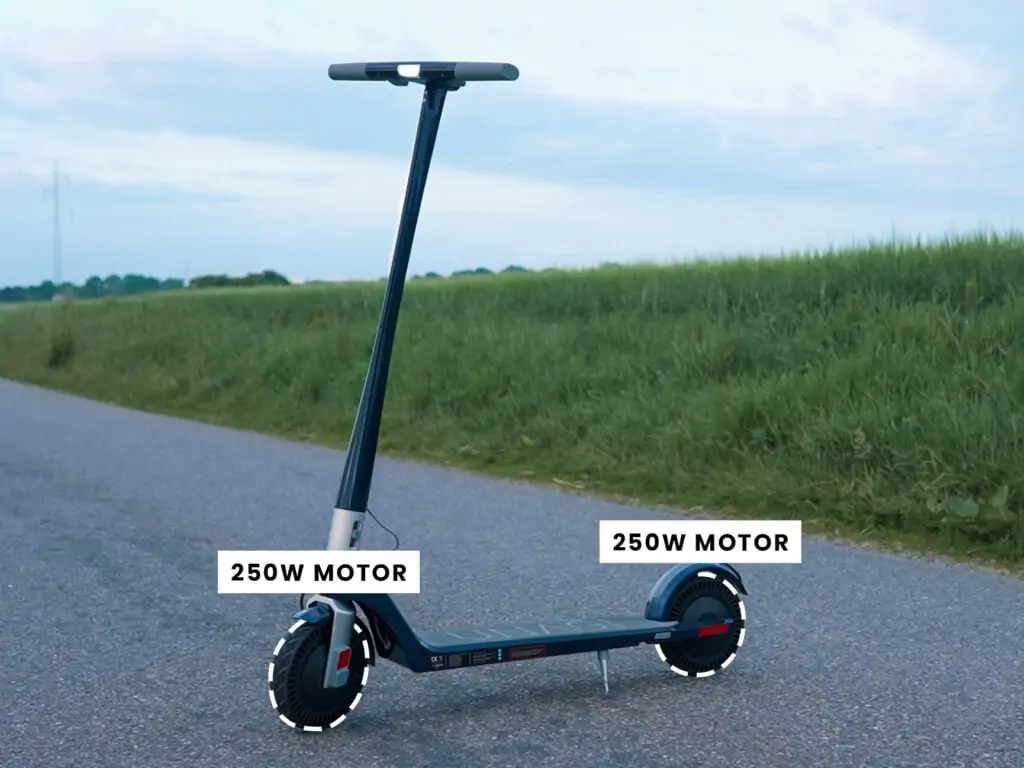
The Unagi Model One comes in two versions which mainly differ in their motor setup. The E250 has a single 250W motor while the E500 version has two motors totaling 500W. Despite the added motor power, both models have a specified top speed of 17 MPH (27.4 KMH).
Running in dual-motor mode as a 170 pounds (77 kg) rider, I topped out at 17.07 MPH (27.47 KMH) in a flat and even surface. Now, I came across a “secret” setting online that unlocks the full speed potential of the unit. Once I had the secret mode unlocked, I was able to clock a top speed of 19.57 MPH (31.49 KMH) so the Model One E500 is definitely capable of more than advertised on the website. It’s a pleasant surprise in a market where it has pretty much become the norm to exaggerate performance to stay competitive.
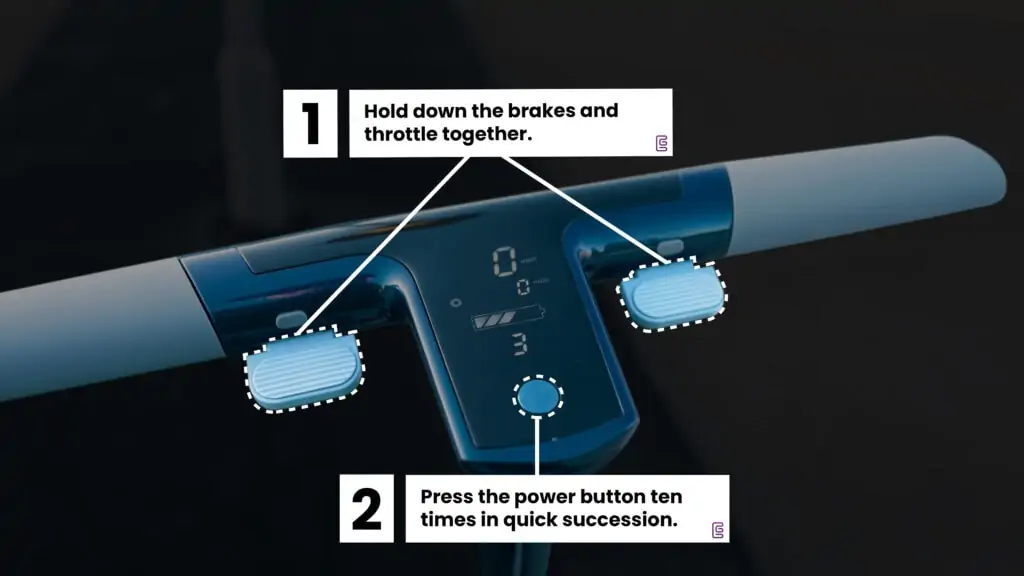
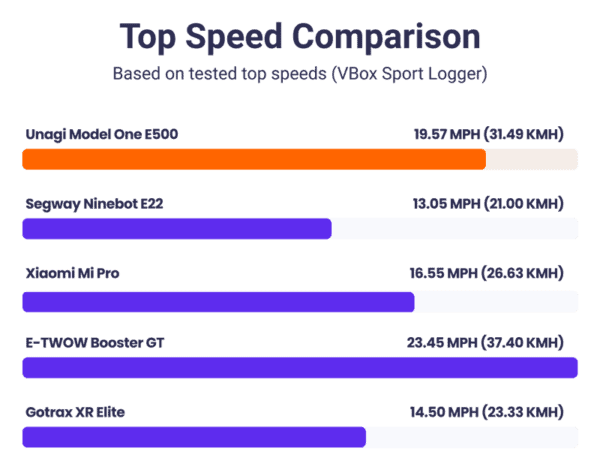
Comparing the top speed to other models in the weight class, the Model One finds itself among the best - only surpassed by some of the E-TWOW models. I would argue, however, that I wouldn’t personally want to go any faster than what the Model One can do on such a small form-factor scooter. Speed-wise, it definitely beats the comparable Segway and Xiaomi models.

Performance retention is one area in which I was super impressed with the Unagi Model One. As the battery level drops, all scooters will see some kind of performance drop that usually affects the top speed and acceleration. To date, I think the Unagi is the scooter I’ve tested with the least drop in performance. The top speed in regular mode stayed pretty much the same until I got down to about 20% battery. We have the high-quality LG lithium-ion battery pack to thank for that.
You may be thinking, if the top speed is the same on both models, why would I want to opt for the dual-motor version that runs you an extra $150? It all comes down to acceleration and hill climb ability and the difference is night and day. With the dual-motor setup, you have double the torque and it really is triple the fun.
| Speed Mode | Avg Time | Best Time |
|---|---|---|
| Dual motors | 5.04 s | 4.78 s |
| Dual motors (unlocked) | 4.34 s | 4.29 s |
| Single motor | 7.75 s | 7.44 s |
In dual-motor mode, I was able to accelerate from 0-15 MPH in 5.04 seconds. With the boosted mode unlocked, I cut that down to just 4.34 seconds, which is the best result I’ve tested in this weight class. When riding in single-motor mode (which is also the performance that can likely be expected on the E250 model), it took me 7.75 seconds to reach the same speed. The E500 is a mean machine with lots of kick in a truly compact size.
The highly superior dual-motor acceleration clearly shows on inclines as well. I tested the scooter out on one of the steepest hills in my area with an elevation grade of 18.2%. When riding in dual-motor, it impressively climbed the incline with an average speed of about 10 miles per hour. In single-motor mode, the scooter did not have near enough power to make it up.
Honestly, I didn’t expect much to begin with in terms of motor performance. But after running all these tests, I can say I’m very surprised - especially by the acceleration which outperformed bigger scooters like the Zero 10 and runs on par with the Evolv Tour XL-R.
The majority of Unagi buyers opt for the E500 over the E250 and it’s clear to me why. The amount of extra performance you get for another $150 makes it a no-brainer in my opinion. Riding in single-motor mode yields underwhelming acceleration and the hill climb ability suffers dramatically so if you live in an area with even one hill, that’d be a good excuse to get the dual-motor version. It should also be said that these motors are virtually silent compared to most other 250W-500W motors I've tried.
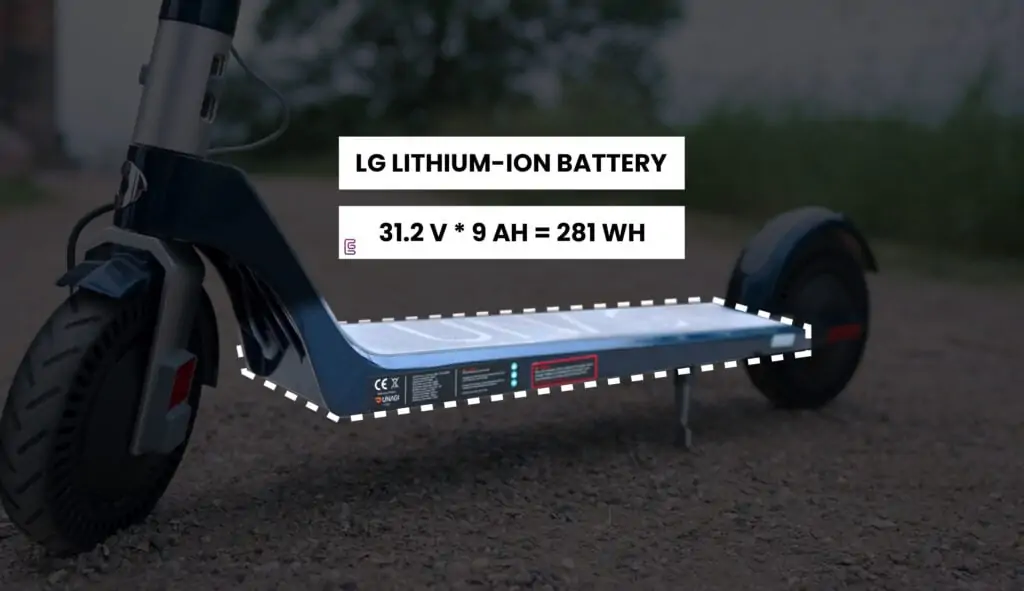
As the Unagi Model One is intended for city commuters, the range is one of the more important aspects of the scooter. Batteries are heavy so if you want an ultra-portable scooter it’ll likely come at the expense of battery capacity.
Despite its compact design, the Unagi Model One packs a 9 Ah LG lithium-ion battery pack with an effective capacity of 281 Wh in the deck.
| Model | Battery Capacity | $ / Wh |
|---|---|---|
| Unagi Model One LG - 9Ah, 31.2V | 281 Wh | $3.52/Wh |
| E-TWOW Booster V Samsung - 10.5Ah, 36V | 378 Wh | $2.51/Wh |
| E-TWOW Booster Sport Samsung - 8.7Ah, 36V | 313 Wh | $2.39/Wh |
| Gotrax XR Ultra LG - 7Ah, 36V | 252 Wh | $1.51/Wh |
| Segway Ninebot E22 Unknown - 5.1Ah, 36V | 184 Wh | $2.55/Wh |
This is shy of some of the E-TWOW scooters but more than comparable Segway, Gotrax and Xiaomi models. If we put the battery capacity up against the scooter price, we can clearly see that the Model One E500 offers the least battery capacity for the money.
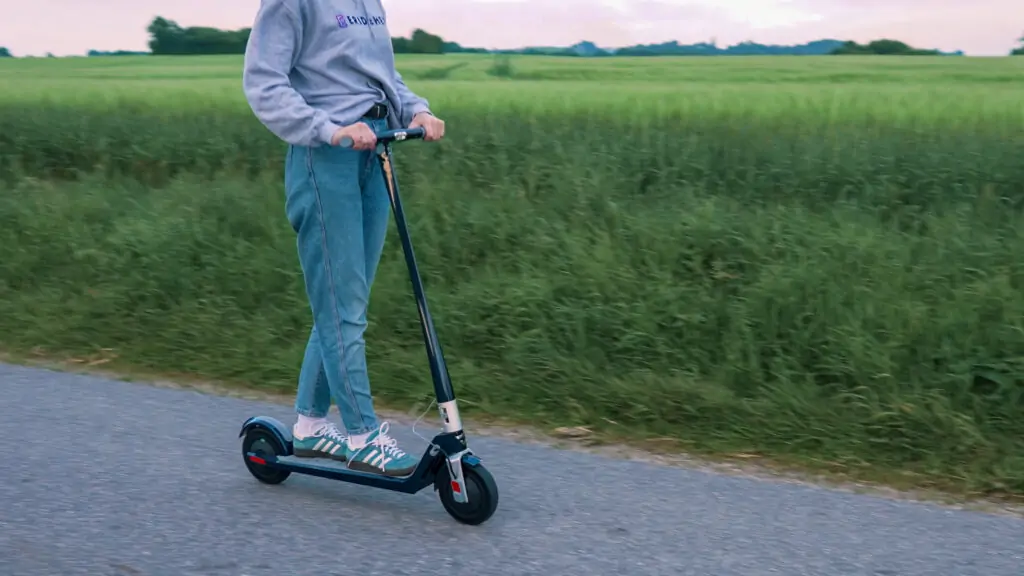
Battery capacity is one thing, but battery performance is just as important. On paper, the Model One has a range of up to 15.5 miles (25 km) but how does it perform in the real world for a 170 pounds (77 kg) rider?
I ran the battery empty from a full charge three times at various average speeds.
| Test (#) | Avg Speed | Range |
|---|---|---|
| #1 (Speed Priority) | 14.7 MPH (23.7 KMH) | 8.32 miles (13.39 km) |
| #2 (Regular) | 12.6 MPH (20.3 KMH) | 9.33 miles (15.02 km) |
| #3 (Range Priority) | 10.4 MPH (16.7 KMH) | 11.12 miles (17.9 km) |
In the first test, I heavily prioritized speed, going full throttle as much as possible. In this test, I got an 8.32-mile range (13.39 km).
Next up is what I’d consider the most accurate real-world test to compare between other models. In this second test, I rode as I’d normally do on casual rides or commutes. This yielded a 9.33-mile range (15.02 km).
In the last test, I tried to maximizing range by riding a bit slower. I got 11.12 miles of range (17.9 km) from that.
While these aren’t out-of-this-world numbers, it’s gonna be enough for most commuters - especially if you bring the charger with you and charge on the go.
While the battery performance is quite good in terms of performance retention and range versus capacity, the overall range is definitely not where the true value of the Unagi Model One lies. If you solely care about range, there is a rather large array of scooters that’ll outperform it at a lower cost.
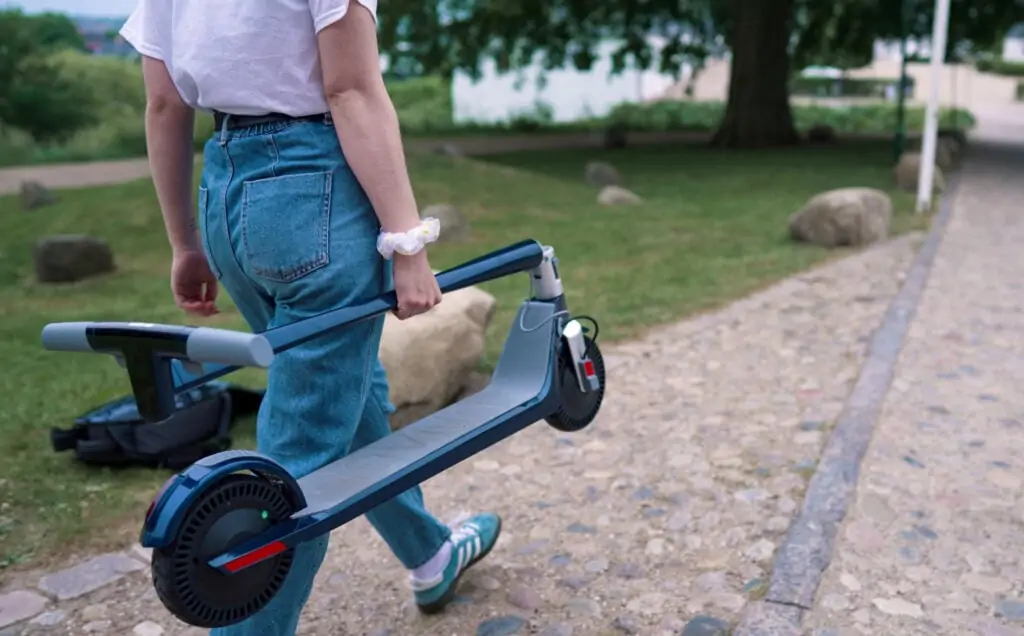
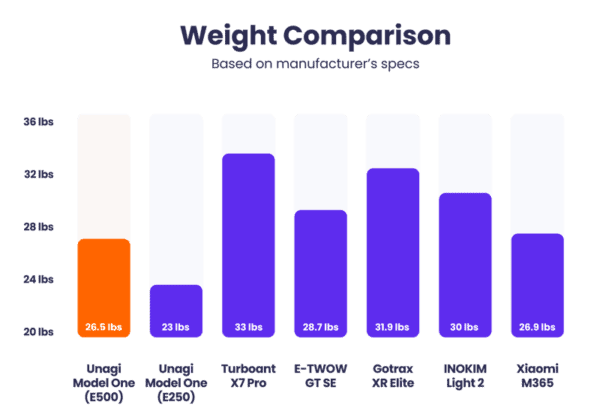
Portability is arguably the area in which the Model One excels the most. This is also where the attention to detail and clever design choices become evident. With the E250 and E500 weighing 23 and 26.5 pounds (10.4 and 12 kg) respectively, this scooter belongs to the ultra-portable category.
Furthermore, the patented one-click folding mechanism makes this the ultimate convenience scooter for the busy commuter. I think this is literally the first time I’ve been able to both fold and unfold a scooter with a single hand in a matter of seconds. Whereas the stem on most other scooters needs to be locked to the rear fender, the Model One stem locks itself into a floating position. It effectively achieves the same thing in fewer steps.
As the battery is located in the deck and not at the stem, the weight distribution is even and the center of gravity is very nice, making it a breeze to handle whether you’re pushing or carrying it.
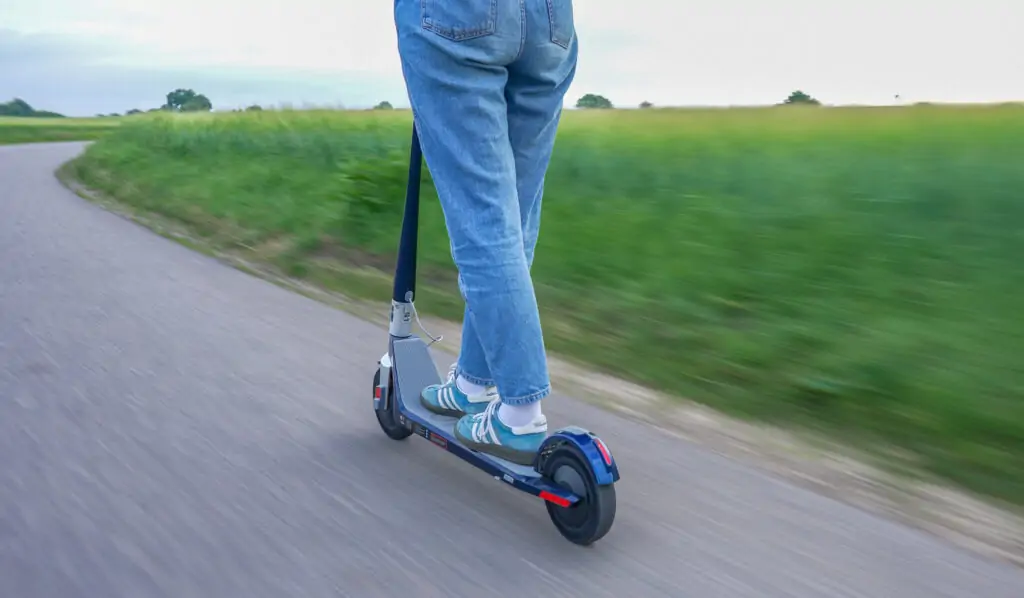
With such an ultra-lightweight and convenient build, there’s bound to be trade-offs and part of that is felt in the ride quality.
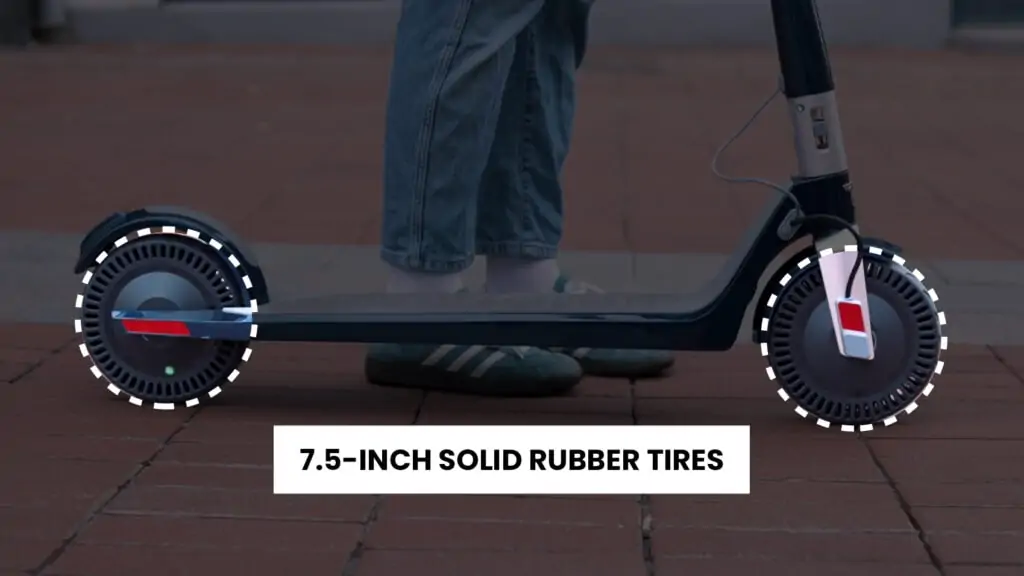
The Unagi Model One features 7.5-inch tires (19 cm) that are both made from solid rubber. Solid tires are practically maintenance-free so you won’t have to worry about flats. However, air-filled tires help with shock absorption, giving you a smoother ride.
As solid rubber tires alone don’t provide any dampening, Unagi designed a tire set to mitigate road vibrations. They added air pockets all the way around the solid rubber tire to help absorb shocks. This is pretty much the same principle seen on honeycomb tires that are popularly used on military vehicles.
So, do they work in practice? Yes, I guess it helps a bit. Does it make the scooter capable of handling any terrain you throw at it? Definitely not. It beats a solid tire with no air pockets but it does not perform like a pneumatic one. I would say, however, that it’s a cool mid-way between the two.
Apart from the minimal cushioning the tires provide, there’s no suspension system in place. While the ride feels great on smooth roads, it quickly gets bumpy when road conditions deteriorate. On bumpy roads, road vibrations are definitely traveling through the scooter up into your arms.
I feel a scooter like this would benefit greatly from having spring suspension at the front. Don’t get me wrong, as long as the pavement is smooth, it’s a bliss to ride but if you hit sketchy roads, the ride quality will definitely be affected.
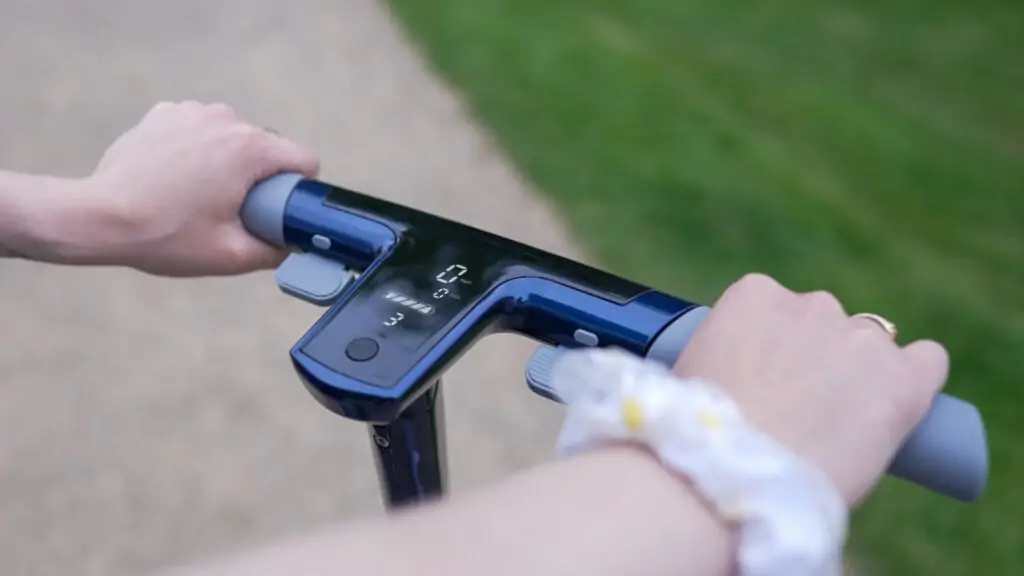
At the cockpit, you have a thumb throttle. The acceleration is surprisingly smooth and it’s always nice to see thumb throttles as many people will find they put less strain on the hands in the long run. Above the throttle is a small button that allows you to navigate through three different speed modes.
The power button at the middle lets you turn the scooter on and off when held down. A single click will enable/disable lights while two clicks in quick succession will enable/disable dual-motor mode.
The display above shows important information including speed, trip mileage, total mileage, battery level, motor mode, speed mode and more. The whole cockpit is sleek and intuitive and it provides all the most important information without being overwhelming.
The scooter has an E-ABS brake that can be activated using your left thumb. This is likely the smoothest electronic braking I’ve ever tried on an electric scooter and because it doesn’t rely on mechanical parts like disc or drum brakes, there’s really no maintenance involved. This is the dream for the busy commuter who doesn’t want to get into the nitty-gritty with misaligned calipers, squeaky breaks and bent rotors.
You can brake quite fast or you can use it to precisely reduce your speed when coasting down a hill. I usually like to have at least one mechanical form of braking on my scooter, should the electronics fail, but being the ultra-convenient zero-maintenance machine it is, it makes sense that Unagi didn’t add it to the Model One.
It does have a manual rear-wheel brake as we see on regular kick scooters but it's not something to rely on and it does wear down the rear tire faster than using the electronic brake if you opt to use it.
To sum up on ride quality, this is a solid option for inner-city commutes where the roads are fairly nice, but it doesn’t absorb enough road vibrations to be a viable option if the road conditions are poor in your area.
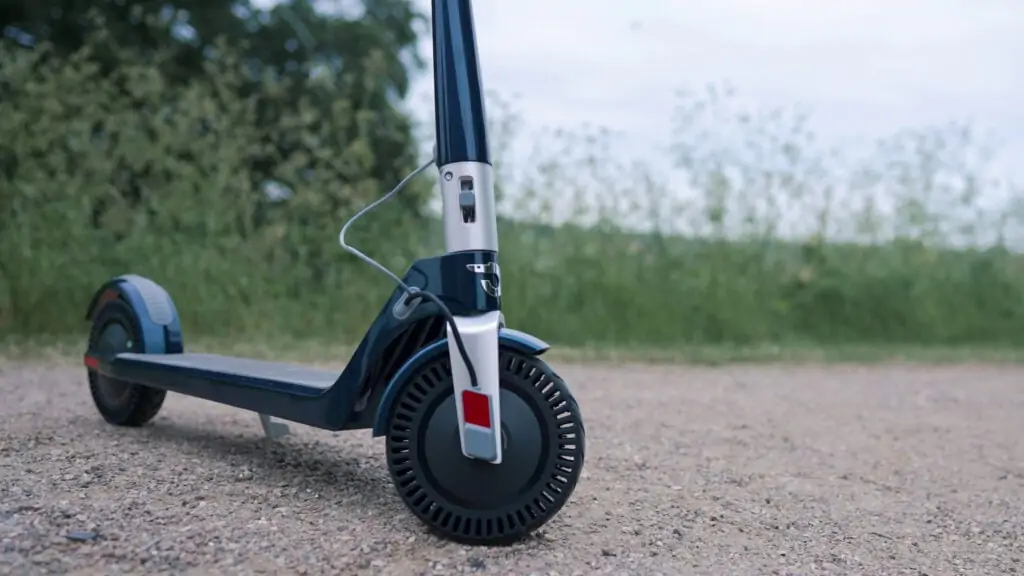
What often separates the entry-level electric scooters from more pricey ones is the build quality. On a strict budget, most manufacturers have to cut corners to keep costs down and that sometimes results in poor design solutions, inferior material usage and a lack of safety features.
It’s safe to say, that this definitely isn’t the case with the Unagi Model One. At this price point, I expected solid build quality and it definitely lives up to and probably even exceeds that. For instance, the handlebar is made from magnesium alloy which is both more expensive to produce and 33% lighter than its aluminum counterpart. Rather than cutting costs and corners, Unagi took extra steps throughout the design process to get this thing as lightweight as possible without sacrificing sturdiness and durability on crucial components.
The folding mechanism hinge is made from stainless steel which provides excellent corrosion resistance so it doesn’t wear down while also providing strength you can feel confident in.
For the stem itself, Unagi uses TORAY carbon fiber which provides an excellent balance of low weight and impressive strength. It’s an expensive material and TORAY carbon fiber is even used by the likes of Elon Musk on his Space-X rockets.
The deck is made from a single piece of sturdy machined aluminum. On top of that, Unagi uses a silicon layer to provide grip. This not only looks better than plain grip tape but is also a lot easier to clean and will last you a longer time. Because of the strong deck design, the scooter has a rather large max load capacity of 275 pounds.
The scooter has an IP54 weather-resistance rating which means it is protected against water splashes and dust.

For safety, the Model One has reflexes on the sides of each wheel, a red taillight and a surprisingly bright 1.8W LED headlight. Visibility is well above average for this unit and the headlight even illuminated the road ahead of me to the point where I was confidently riding it in complete darkness.
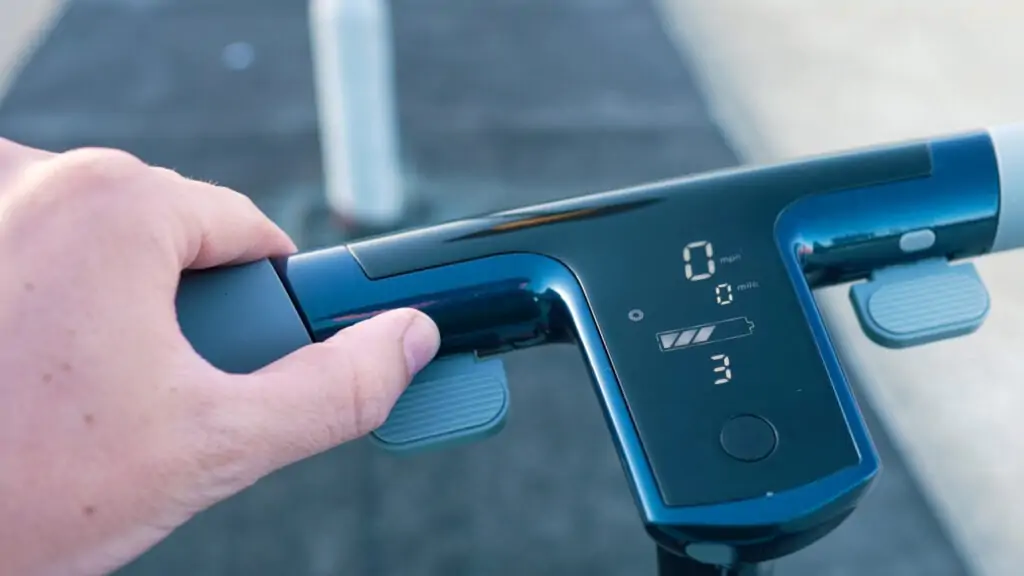
Another safety feature I really like is the electronic horn that’s at your disposal through the cockpit. It’s loud and clear - definitely much better than an ordinary bell.
The attention to detail shines throughout the unit. From the clever folding mechanism to the custom-designed kickstand floating ever so slightly by the side of the deck, the Unagi Model One is an extremely well-designed scooter. Unagi really went an extra mile to lower the weight while maintaining strength in the design and it’s evident that they’ve tested their scooters a lot to discover things that could be optimized before releasing the product to the world. This is part of what you pay for and I think Unagi definitely deserves appreciation for that.
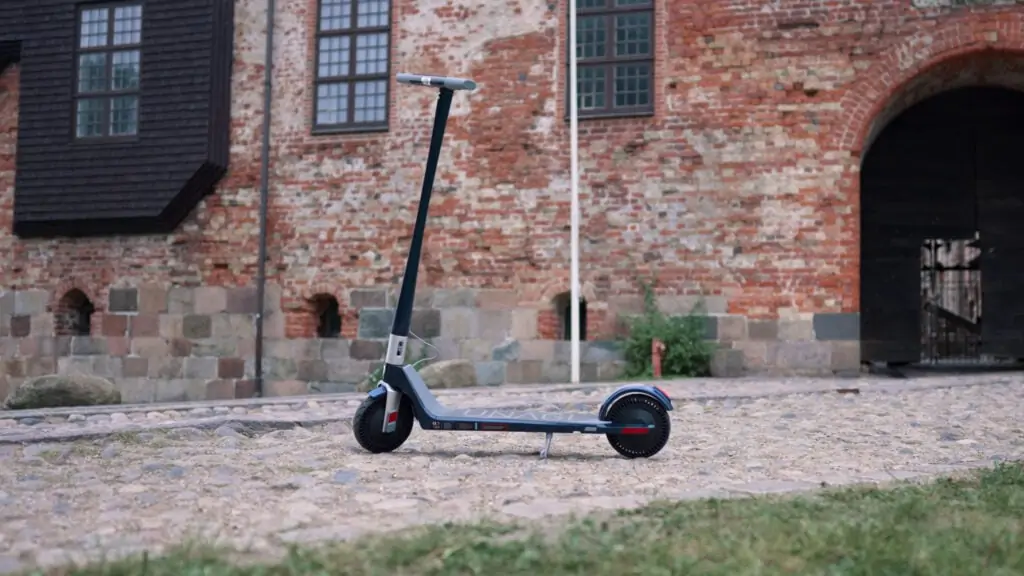
After all my tests, I can say I’m positively surprised by what the Unagi Model One offers. I’m not gonna lie, I went into the review process thinking that this scooter was probably a little over-priced but I now realize that the true value of the Unagi Model One does not lie in things like range. It lies in the unrivaled convenience, the wonderful build quality and the eye-catching minimalist design.
On the E500, the motor performance is excellent and it easily beats its closest competitors in terms of acceleration. The 19.57 MPH top speed (31.49 KMH) is more than enough for a scooter of this size in my opinion and its pull on inclines is great as well.
The battery performance is solid but the capacity versus cost is not something to write home about. Still, a 9.33-mile range (15.02 km) is gonna be sufficient for most commuters on their daily routine, especially if they bring the charger with them.
The ride quality does suffer a bit due to limited suspension but if you use the Unagi Model One on smooth pavements as intended, it’ll feel good to ride on. Hopefully, we get a Model Two with front spring suspension and 8-inch tires for those slightly rougher roads in the future.
The scooter is intelligently built, easy to grasp, and extremely portable and lightweight. The folding mechanism is nicely streamlined - definitely one of the most effective systems I’ve seen so far.
The Model One is for those of you who care about the looks of your scooters but also value a lightweight and effective design with excellent motor performance highly. No scooter is perfect but for the intended usage, the Model One E500 absolutely hits the nail. The E500 is clearly the better value option out of the two models so if you have the extra money, definitely go for that.
Just before we end, I want to highlight that Unagi recently introduced an All-Access subscription plan that gets you a Unagi E500 with insurance included at just $39/month. They only service certain areas in the US at the moment, but they seem to be constantly expanding and the user feedback looks to be nothing short of great. If you’re just diving into the e-scooter scene, this may be the way to go.
Also See: Best Electric Scooters of 2024 (ERideHero's Picks)
* These specifications are based on our own performance tests and may deviate from the data shared by the manufacturer.
The following differences are based on the manufacturer's specifications
| Model One E250 | Model One E500 | |
|---|---|---|
| Weight | 23 lbs (10.4 kg) | 26.5 lbs (12 kg) |
| Motor Power | 250W | 500W |
| Max Torque | 16N.m | 32N.m |
| Instant Max Power | 500W | 1000W |
| Max Incline Rate | 6 degrees | 15 degrees |
| Top Speed (Manufacturer) | 17 MPH (27.36 KMH) |
| Top Speed (Our Tests) | 19.57 MPH (31.49 KMH) |
| Range (Manufacturer) | 15.5 miles (25 km) |
| Range (Our Tests) | Speed Priority: 8.32 miles (13.39 km) Regular: 9.33 miles (15.02 km) Range Priority: 11.12 miles (17.9 km) |
| Acceleration 0-15 MPH (Our Tests) | 4.34 s (Dual-motor, unlocked) 5.04 s (Dual-motor) 7.75 s (Single-motor) |
| Usable Deck Space | 18.5" x 5.3" (47 cm x 13.5 cm) |
| Ground Clearance | 3.6" (9.1 cm) |
| Deck To Handlebar | 37.2" (94.5 cm) |
| Handlebar Width | 16.4" (41.6 cm) |
| Unfolded Dimensions | 37.8" x 16.54" x 43.31" (96 cm x 42 cm x 110 cm) |
| Folded Dimensions | 37.8" x 16.54" x 14.96" (96 cm x 42 cm x 38 cm) |
| Weight | 26.5 pounds (12 kg) |
| Tire Size | 7.5 inches |
| Motor Power | 2*250W |
| Peak Power | 2*500W |
| Brakes | E-ABS |
| Max Incline Rate | 15 degrees |
| Weather Resistance | IP54 |
| Battery | LG li-ion 9Ah, 31.2V |
| Battery Capacity | 281 Wh |
| Charging Time | 4-5 hours |
| Max Load Capacity | 275 pounds (125 kg) |